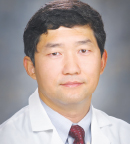
Jianjun Zhang, MD, PhD
Certain physicians know they want to become doctors from a very young age. Others start on a different path until something happens to alter their plans. This was the case for Jianjun Zhang, MD, PhD, Assistant Professor at The University of Texas MD Anderson Cancer Center.
“When I was a kid, I wanted to be an astronaut,” Dr. Zhang recalled. “Later, I became interested in physics—but in high school, my father was diagnosed with cancer, and he passed away within a year, so that changed my whole career path.”
Ultimately, Dr. Zhang pursued a career in medical oncology, hoping to make a difference for people facing cancer. In 2015, he received a Conquer Cancer Young Investigator Award supported by AstraZeneca to study lung cancer. The award was one of his first important research grants and helped support work that Dr. Zhang and his team are building upon today.
“We’re using next-generation sequencing technology to try to understand how cancers are different—why some respond to treatment and others don’t,” explained Dr. Zhang.
The results of his research could lead to better treatments and improved outcomes for people living with lung cancer. “Long term, we’re trying to understand why certain cancers do not respond to treatment and therefore develop a novel treatment strategy; short term, we’re trying to develop biomarkers to benefit patients by matching patients with the most appropriate treatment for them,” said Dr. Zhang.
Dr. Zhang emphasized that the support provided by Conquer Cancer donors is critical to helping researchers improve the current standard of care.
“The current cancer treatment is suboptimal,” said Dr. Zhang. “In the clinic I feel every day I’m helping patients—and unfortunately we fail a lot of times, but whenever there’s a good story, we jump for joy.” ■
© 2018. American Society of Clinical Oncology. All rights reserved.

